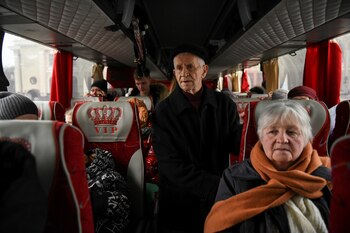
Under the pretext of “denazifying” Ukraine, Russian President Vladimir Putin launched a war against his neighbor. But now the Jewish community, which has lived until a month ago a time of splendour in the country after decades of devastation and migration due to the Holocaust and Soviet repression, is evacuating its faithful.
In the Chabad synagogue, in the heart of the port city of Odessa and the only one open of the four that existed before the war, about twenty Jews come to recite the Shaharit, the morning prayer, and then go to work or volunteer in the city, where there is great tension due to a possible attack by Russia.
But that synagogue is not what it used to be, since now the wooden benches look practically empty compared to how they were filled before February 24.
Of the 25,000 Jews registered by the Odessa community, one of the largest in the country, at least 5,000 have been evacuated to Moldova since the war began, according to data from the Jewish community offered to Efe.
While the rest have either stayed by their relatives or are not fit to leave because they are men and are old enough to be called by the Army to fight the Russians.
“DENAZIFICATION? A LIE”
The director of the Jewish Museum in Odessa, Zvi Hirsh, opens the doors of the small hidden space where he keeps relics of the Holocaust and the migration of Jews throughout the 20th century.
Twenty-five years he has lived in this coastal city, the so-called pearl of the Black Sea, in which “no one” has looked at him badly on the streets or “insulted” him because he is Jewish, he tells Efe.
“What I understand is that Putin is lying,” he says of denazification, noting that “there is no point” that point in the speech to invade Ukraine.
Putin insists that the resolution of the conflict with Ukraine would only be possible if one takes into account Russia's “legitimate security interests”, including the “sovereignty of Crimea”, illegally annexed in 2014, as well as the “demilitarization and denazification” of the Ukrainian state, as well as its neutral status.
At the end of the prayer, the senior rabbi of Odessa and southern Ukraine, Abraham Wolf, sits in his office where he receives several calls, including from his wife, who has fled and is in Germany.
Originally from Israel, he arrived in Odessa at the age of 22, but the 30 years he has been working in the city for the Jewish community “have disappeared,” he tells Efe.
“What I have achieved in 30 years has disappeared. And all in a second. But it's what God wants, I do my job and this is the result,” he says.
Regarding “denazification”, the rabbi says he does not want to talk about politics, although he lets it be understood that Putin has made a mistake.
“Three plus one equals four. But now (for him) one plus one is a million,” he says, alluding to the fact that the Russian president has made a big mistake in launching the invasion under the justification of “denazification”.
tolerance
The rabbi points out that before the war, there were two exclusively Jewish nurseries in the city, two orphanages, primary schools and even a Jewish university. In total, eleven buildings for the Jewish community, including four synagogues. “But now, everything is closed,” he says, except for the Chabad synagogue.
Wolf says that even though the Russian occupation arrives in the city, since Odessa is among the most imminent targets of Moscow's troops, it will stay.
It refers to two acquaintances who are currently in two Ukrainian cities under Russian occupation and who continue to work, without wanting to publicly reveal any further details.
“We are doing everything for the Jewish community. I don't know what's going to happen, but I don't want to look for an explanation, I don't want to imagine or fantasize,” he says, although what he does know is that he is going to stay in Odessa. Another one who doesn't want to “talk about politics” because he says he “doesn't have time” is Oleg, 40 years old and who wears a sweatshirt from Mossad, the Israeli Intelligence Service.
“I don't have time to read the news, but I do know that we help those who need it,” he says, being asked about the “denazification” of the country.
Christina, a Ukrainian and American Jew who accompanies him in the evacuation task, tells Efe that there is “no reason” in Ukraine to say that the country is “Nazi”.
(with information from EFE)
KEEP READING:
Últimas Noticias
Debanhi Escobar: they secured the motel where she was found lifeless in a cistern

The oldest person in the world died at the age of 119

Macabre find in CDMX: they left a body bagged and tied in a taxi
The eagles of America will face Manchester City in a duel of legends. Here are the details

Why is it good to bring dogs out to know the world when they are puppies




